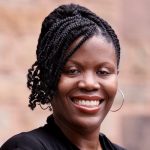
College of Wooster
African American literary, visual, and performing artists have created cultural expression that reclaims and critiques notions of religious belief as part and parcel of Black political agency and progress. They have done so by constructing images of thresholds and illustrating the concept of dissonance. This presentation briefly explores written texts, visual culture, dance, and music to examine the ways in which debates about the necessity of eliminating already porous boundaries between religious belief (Christianity, in particular) and the secular signify more specific anxieties about the place in everyday life of progressive politics.
In this context, thresholds are Christian belief-related points of entry or beginnings for sociopolitical change. As the place where religious belief and political life meet, thresholds force the two halves of each dualism—sin and virtue, fact and fiction, spirit and body, beginning and ending, right and wrong, men and women, past and present, individual and collective, life and death, among many others—to grapple with each other. That process, in turn, can result in dissonance, and the conflict gradually causes sociopolitical change in African American communities.
Photographs, films, writings, and songs have constructed, questioned, and dismantled binaries along a number of axes, notably between Christian belief and progressive politics. Artists and scholars explicitly or implicitly prompt us to imagine the benefits of a more open conceptualization of Christian belief and the secular as fluid, benefits that include expanding the possibilities for social change. Though these interactions may provoke conservative fear—particularly the fear that progressive politics and issues of gender and sexuality may snuff out Christian belief—it is also possible for dissonance to expand and strengthen both halves of the duality.